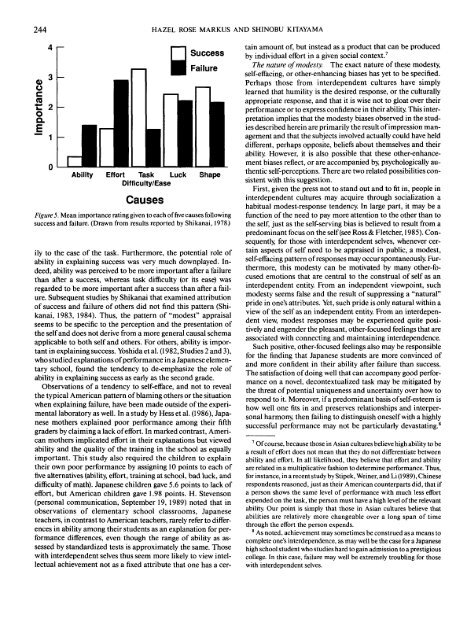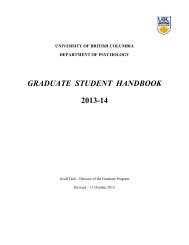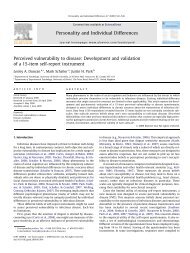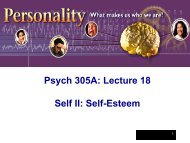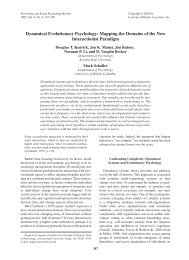Culture and the Self: Implications for Cognition, Emotion, and ... - iacmr
Culture and the Self: Implications for Cognition, Emotion, and ... - iacmr
Culture and the Self: Implications for Cognition, Emotion, and ... - iacmr
Create successful ePaper yourself
Turn your PDF publications into a flip-book with our unique Google optimized e-Paper software.
244 HAZEL ROSE MARKUS AND SHINOBU KITAYAMA<br />
a,<br />
u<br />
3<br />
c<br />
(0<br />
t: 2<br />
o a.<br />
E<br />
"" 1<br />
gSuccess<br />
Failure<br />
Ability Ef<strong>for</strong>t Task Luck Shape<br />
Difficulty/Ease<br />
Causes<br />
Figure 5. Mean importance rating given to each of five causes following<br />
success <strong>and</strong> failure. (Drawn from results reported by Shikanai, 1978.)<br />
ily to <strong>the</strong> ease of <strong>the</strong> task. Fur<strong>the</strong>rmore, <strong>the</strong> potential role of<br />
ability in explaining success was very much downplayed. Indeed,<br />
ability was perceived to be more important after a failure<br />
than after a success, whereas task difficulty (or its ease) was<br />
regarded to be more important after a success than after a failure.<br />
Subsequent studies by Shikanai that examined attribution<br />
of success <strong>and</strong> failure of o<strong>the</strong>rs did not find this pattern (Shikanai,<br />
1983, 1984). Thus, <strong>the</strong> pattern of "modest" appraisal<br />
seems to be specific to <strong>the</strong> perception <strong>and</strong> <strong>the</strong> presentation of<br />
<strong>the</strong> self <strong>and</strong> does not derive from a more general causal schema<br />
applicable to both self <strong>and</strong> o<strong>the</strong>rs. For o<strong>the</strong>rs, ability is important<br />
in explaining success. Yoshida et al. (1982, Studies 2 <strong>and</strong> 3),<br />
who studied explanations of per<strong>for</strong>mance in a Japanese elementary<br />
school, found <strong>the</strong> tendency to de-emphasize <strong>the</strong> role of<br />
ability in explaining success as early as <strong>the</strong> second grade.<br />
Observations of a tendency to self-efface, <strong>and</strong> not to reveal<br />
<strong>the</strong> typical American pattern of blaming o<strong>the</strong>rs or <strong>the</strong> situation<br />
when explaining failure, have been made outside of <strong>the</strong> experimental<br />
laboratory as well. In a study by Hess et al. (1986), Japanese<br />
mo<strong>the</strong>rs explained poor per<strong>for</strong>mance among <strong>the</strong>ir fifth<br />
graders by claiming a lack of ef<strong>for</strong>t. In marked contrast, American<br />
mo<strong>the</strong>rs implicated ef<strong>for</strong>t in <strong>the</strong>ir explanations but viewed<br />
ability <strong>and</strong> <strong>the</strong> quality of <strong>the</strong> training in <strong>the</strong> school as equally<br />
important. This study also required <strong>the</strong> children to explain<br />
<strong>the</strong>ir own poor per<strong>for</strong>mance by assigning 10 points to each of<br />
five alternatives (ability, ef<strong>for</strong>t, training at school, bad luck, <strong>and</strong><br />
difficulty of math). Japanese children gave 5.6 points to lack of<br />
ef<strong>for</strong>t, but American children gave 1.98 points. H. Stevenson<br />
(personal communication, September 19, 1989) noted that in<br />
observations of elementary school classrooms, Japanese<br />
teachers, in contrast to American teachers, rarely refer to differences<br />
in ability among <strong>the</strong>ir students as an explanation <strong>for</strong> per<strong>for</strong>mance<br />
differences, even though <strong>the</strong> range of ability as assessed<br />
by st<strong>and</strong>ardized tests is approximately <strong>the</strong> same. Those<br />
with interdependent selves thus seem more likely to view intellectual<br />
achievement not as a fixed attribute that one has a certain<br />
amount of, but instead as a product that can be produced<br />
by individual ef<strong>for</strong>t in a given social context. 7<br />
The nature of modesty. The exact nature of <strong>the</strong>se modesty,<br />
self-effacing, or o<strong>the</strong>r-enhancing biases has yet to be specified.<br />
Perhaps those from interdependent cultures have simply<br />
learned that humility is <strong>the</strong> desired response, or <strong>the</strong> culturally<br />
appropriate response, <strong>and</strong> that it is wise not to gloat over <strong>the</strong>ir<br />
per<strong>for</strong>mance or to express confidence in <strong>the</strong>ir ability. This interpretation<br />
implies that <strong>the</strong> modesty biases observed in <strong>the</strong> studies<br />
described herein are primarily <strong>the</strong> result of impression management<br />
<strong>and</strong> that <strong>the</strong> subjects involved actually could have held<br />
different, perhaps opposite, beliefs about <strong>the</strong>mselves <strong>and</strong> <strong>the</strong>ir<br />
ability. However, it is also possible that <strong>the</strong>se o<strong>the</strong>r-enhancement<br />
biases reflect, or are accompanied by, psychologically au<strong>the</strong>ntic<br />
self-perceptions. There are two related possibilities consistent<br />
with this suggestion.<br />
First, given <strong>the</strong> press not to st<strong>and</strong> out <strong>and</strong> to fit in, people in<br />
interdependent cultures may acquire through socialization a<br />
habitual modest-response tendency. In large part, it may be a<br />
function of <strong>the</strong> need to pay more attention to <strong>the</strong> o<strong>the</strong>r than to<br />
<strong>the</strong> self, just as <strong>the</strong> self-serving bias is believed to result from a<br />
predominant focus on <strong>the</strong> self (see Ross & Fletcher, 1985). Consequently,<br />
<strong>for</strong> those with interdependent selves, whenever certain<br />
aspects of self need to be appraised in public, a modest,<br />
self-effacing pattern of responses may occur spontaneously. Fur<strong>the</strong>rmore,<br />
this modesty can be motivated by many o<strong>the</strong>r-focused<br />
emotions that are central to <strong>the</strong> construal of self as an<br />
interdependent entity. From an independent viewpoint, such<br />
modesty seems false <strong>and</strong> <strong>the</strong> result of suppressing a "natural"<br />
pride in one's attributes. Yet, such pride is only natural within a<br />
view of <strong>the</strong> self as an independent entity. From an interdependent<br />
view, modest responses may be experienced quite positively<br />
<strong>and</strong> engender <strong>the</strong> pleasant, o<strong>the</strong>r-focused feelings that are<br />
associated with connecting <strong>and</strong> maintaining interdependence.<br />
Such positive, o<strong>the</strong>r-focused feelings also may be responsible<br />
<strong>for</strong> <strong>the</strong> finding that Japanese students are more convinced of<br />
<strong>and</strong> more confident in <strong>the</strong>ir ability after failure than success.<br />
The satisfaction of doing well that can accompany good per<strong>for</strong>mance<br />
on a novel, decontextualized task may be mitigated by<br />
<strong>the</strong> threat of potential uniqueness <strong>and</strong> uncertainty over how to<br />
respond to it. Moreover, if a predominant basis of self-esteem is<br />
how well one fits in <strong>and</strong> preserves relationships <strong>and</strong> interpersonal<br />
harmony, <strong>the</strong>n failing to distinguish oneself with a highly<br />
successful per<strong>for</strong>mance may not be particularly devastating. 8<br />
7 Of course, because those in Asian cultures believe high ability to be<br />
a result of ef<strong>for</strong>t does not mean that <strong>the</strong>y do not differentiate between<br />
ability <strong>and</strong> ef<strong>for</strong>t. In all likelihood, <strong>the</strong>y believe that ef<strong>for</strong>t <strong>and</strong> ability<br />
are related in a multiplicative fashion to determine per<strong>for</strong>mance. Thus,<br />
<strong>for</strong> instance, in a recent study by Stipek, Weiner, <strong>and</strong> Li (1989), Chinese<br />
respondents reasoned, just as <strong>the</strong>ir American counterparts did, that if<br />
a person shows <strong>the</strong> same level of per<strong>for</strong>mance with much less ef<strong>for</strong>t<br />
expended on <strong>the</strong> task, <strong>the</strong> person must have a high level of <strong>the</strong> relevant<br />
ability. Our point is simply that those in Asian cultures believe that<br />
abilities are relatively more changeable over a long span of time<br />
through <strong>the</strong> ef<strong>for</strong>t <strong>the</strong> person expends.<br />
8 As noted, achievement may sometimes be construed as a means to<br />
complete one's interdependence, as may well be <strong>the</strong> case <strong>for</strong> a Japanese<br />
high school student who studies hard to gain admission to a prestigious<br />
college. In this case, failure may well be extremely troubling <strong>for</strong> those<br />
with interdependent selves.


